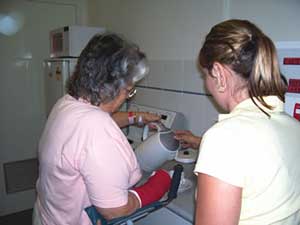Diversional Therapist
Tasks & duties

Diversional therapists may do some or all of the following:
-
plan and prepare recreational events and activities
-
talk to participants' families to gain an understanding of the person, and their needs and interests
-
encourage participation and enjoyment in these events and activities
-
advise participants on how to do the activities
-
assess and document their progress
-
supervise events and activities
-
discuss participants' progress with medical and other professionals, and families
Skills & knowledge
Diversional therapists need to have:
-
planning and organisational ability
-
communication skills
-
leadership skills and the ability to motivate people
-
observational skills
-
knowledge of art and craft techniques, and sporting and cultural activities
-
knowledge of safety issues and first aid
-
creative ability
Entry requirements
There are no specific requirements to become a Diversional therapist. However, to become a registered Diversional therapist you need to complete a National Certificate in Diversional Therapy (Level 4).
Training on the job
Many people complete the National Certificate in Diversional Therapy part time while working in a related role.
Useful experience
Work experience with the elderly or people with disabilities is useful for people wanting to become Diversional therapists.
Related courses
Community Client Care
Health Care Assistant
Support for the Older Person
For more information, please refer to Career Services.
Document Actions
